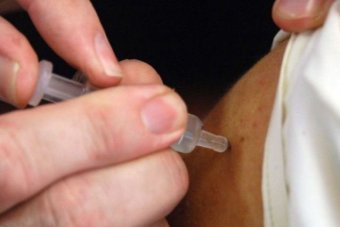
A world-first research trial in Tasmania will look at the impact of vaccines on the immune systems of elderly people.
The Clifford Craig Medical Research Trust is donating nearly $180,000 for the two-year study at the Launceston General Hospital.
Lead scientist Professor Katie Flanagan previously studied the effects of some vaccines on infants but has never examined their impacts on older age groups.
“Our studies in African children demonstrate that DTP [diphtheria, tetanus, whole-cell pertussis] vaccination can lead to impaired immunity but it’s not known if the DTP vaccination used in Australia has the same effect,” she said.
“This study will investigate the effects of DTP and influenza vaccination on the immune systems of the elderly.
“It’ll tell us whether vaccines change the immune systems of the elderly in this non-specific way.”
Professor Flanagan said the wider impacts of vaccines on older Australians were largely unknown.
“We need to know whether vaccines are doing profound things on the elderly,” she said.
“We need to understand whether vaccines can also interfere with one another in the elderly.
“DTP and flu vaccine get given together all the time but no one has ever studied what impact that would have, one on the other.”
Professor Flanagan said she believed the study could have enormous implications.
“I think the question of why the elderly respond less well to vaccines is a major public health priority,” she said.
“[The World Health Organisation] want answers, they’ve asked for answers.
“This will provide the much needed evidence to optimise vaccine responses in older age groups.”
Research vital as population ages
Professor Flanagan said the research could change the way vaccines were scheduled, to ensure better health outcomes.
“This is a paradigm shift. It’s… suggesting vaccines have non-targeted effects,” she said.
“It’s not easy to change schedules and change patterns of behaviour.
“The bottom line is, we are trying to understand in great detail what these vaccines do to the immune system and how they affect one another, in order to… improve vaccine responses in the elderly.”
Clifford Craig Medical Research Trust chief executive Peter Milne said the research was important to regional areas in particular.
“Infectious diseases specialists don’t normally operate at regional hospitals such as ours, and so we find it’s our role and that it’s important that we support someone like Katie,” he said.
“Her vaccine research is world class and we are delighted that our funding support will enable her to undertake the trial from our hospital.
“This research could lead to beneficial outcomes for older age groups, and this is vitally important as Tasmania has an ageing population.”
Final results from the trial are expected in three years.
